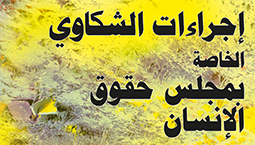معلومات أساسية عن مجلس حقوق الإنسان
مجلس حقوق الإنسان هيئة حكومية دولية داخل منظومة الأمم المتحدة مسؤولة عن تدعيم تعزيز جميع حقوق الإنسان وحمايتها في جميع أرجاء العالم وعن تناول حالات انتهاكات حقوق الإنسان وتقديم توصيات بشأنها. والمجلس لديه القدرة على مناقشة جميع القضايا والحالات المواضيعية لحقوق الإنسان التي تتطلب اهتمامه طوال العام. ويعقد المجلس اجتماعاته في مكتب الأمم المتحدة في جنيف.
والمجلس مؤلف من 47 دولة عضواً في الأمم المتحدة تنتخبها الجمعية العامة للأمم المتحدة. وقد حل مجلس حقوق الإنسان محل لجنة الأمم المتحدة السابقة لحقوق الإنسان .
At a glance
The Human Rights Council is the main intergovernmental body within the United Nations responsible for human rights. Established in 2006 by the General Assembly, it is responsible for strengthening the promotion and protection of human rights around the globe.
The Council, composed of 47 Member States, provides a multilateral forum to address human rights violations and country situations. It responds to human rights emergencies and makes recommendations on how to better implement human rights on the ground.
The Council benefits from substantive, technical, and secretariat support from the Office of the High Commissioner for Human Rights (OHCHR).
The Human Rights Council replaced the former United Nations Commission on Human Rights.
The Human Rights Council in numbers from 2006 to 2022:
- 51 regular sessions held
- 35 special sessions held
- 8 urgent debates held
- 1,372 resolutions adopted
- 59 Special Procedures mandates established
- 37 commissions of inquiry and fact-finding missions set up
- 123 of the 193 UN Member States have served on the Council
Watch the video about the UN Human Rights Council - 50 sessions later.
Access an easy-to-read document about the Human Rights Council
What the Council does
- Serves as an international forum for dialogue on human rights issues with UN officials and mandated experts, states, civil society, and other participants;
- Adopts resolutions or decisions during regular sessions that express the will of the international community on given human rights issues or situations. Adopting a resolution sends a strong political signal which can prompt governments to take action to remedy those situations;
- Holds crisis meetings known as special sessions to respond to urgent human rights situations, 36 of which have been held to date;
- Reviews the human rights records of all United Nations Member States via the Universal Periodic Review;
- Appoints the Special Procedures, independent human rights experts who serve as the eyes and ears of the Council by monitoring situations in specific countries or by looking at specific themes; and
- Authorizes commissions of inquiry and fact-finding missions, which produce hard-hitting evidence on war crimes and crimes against humanity.
See the session agenda and learn more about what goes on year-round at the Council.
Council membership and elections
The Human Rights Council consists of 47 Member States elected directly and individually by a majority of the 193 states of the UN General Assembly. Elections take place every year. Seats are equitably distributed among the five UN regional groups, with one-third of the members being renewed each year. Each member serves a three-year term. Membership is limited to two consecutive terms. As of December 2022, 123 of the 193 Member States of the United Nations have served as Council members.
Rotating membership of the Council reflects the UN’s diversity and gives it legitimacy when speaking out on human rights violations in all countries.
Members commit to upholding human rights and are expected to cooperate fully with the Council. The General Assembly may vote to suspend a membership in the case of gross and systematic violations of human rights.
Learn more about the Human Rights Council elections.
The Council has a bureau which consists of a president and four vice-presidents who represent each of the regional groups.
The different mechanisms and entities of the Council
The Human Rights Council consists of different mechanisms and entities, as set out in the Council’s 'Institution-building package' (Resolution 5/1) of 2007. These include:
- The Universal Periodic Review (UPR), a State-led mechanism that regularly assesses the human rights situations of all United Nations Member States.
- The Special Procedures are individuals or groups, not employed by the UN, who speak out on themes such as education, health, free speech, and human trafficking, as well as on country situations including Ukraine, DPRK, Eritrea, and Iran, among others.
- The Advisory Committee serves as the Council’s “think tank,” providing it with expertise and advice on thematic human rights issues.
- The Complaint Procedure allows people and organizations to bring human rights violations to the attention of the Human Rights Council.
There are several more mechanisms, including platforms for dialogue and groups dedicated to evolving legal human rights instruments. Learn more about the full breadth of the Human Rights Council's mechanisms, bodies and forums.
المعارض العامة والأحداث الخاصة
كتيبات
وثائق المعلومات الأساسية
- النظام الداخلي للجمعية العامة
- النظام الداخلي للجمعية العامة
- التعديل 1
- التعديل 2
- تعديل المادة 1
- وثائق الخلفية
نبذة عن المجلس
- نبذة عن مجلس حقوق الإنسان
(نسخة سهلة القراءة *) مذكرة إحاطة عن لجنة حقوق الإنسان - بالإنجليزية |بالفرنسية |بالاسبانية معلومات مصورة
- بالعربية |بالإنجليزية |بالفرنسية |بالاسبانية |بالروسية |بالصينية

